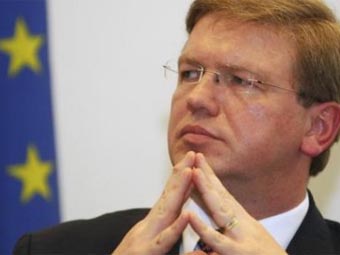Centre for European Transformation has conducted the third comprehensive study in form of monitoring of the implementation of the UNESCO Convention on the Protection and Promotion of the Diversity of Cultural Expressions by the Republic of Belarus.
Štefan Füle, "Sick man of Europe?"

European Commissioner on Enlargement and Neighbourhood policy Mr. Štefan F�resses that Belarusian issue remains one urgent priorities for the European Union. Their current approach in the country has two key strands.
European Commissioner on Enlargement and Neighbourhood policy Mr. Štefan Füle stresses that Belarusian issue remains one urgent priorities for the European Union. Their current approach in the country has two key strands.
The first consists of a range of sanctions which target the heart of the regime. The EU has been clear that further bilateral engagement with the Belarusian authorities will not be possible until all political prisoners have been released and rehabilitated, and significant progress is made on human rights. Mr. Füle makes the important remark that not the regime but the people are in focus of the European policies: “We will maintain our cooperation with the authorities only in areas where we consider that withdrawing our support would impact on the Belarusian people rather than the regime”.
The second is the engagement with all those in Belarus who support reform and modernisation. Mr. Füle draws the attention in particular towards the cooperation with the civil society organisations in Belarus: “The role of civil society organisations is particularly crucial, as they are at the forefront of the struggle for democratic principles and human rights”.
Cooperation with the Belarusian political opposition is also maintained. It will contribute to the discussions of the potential European future for the country. The EU engages “to support them in becoming increasingly relevant to the people of Belarus”. This cooperation is conditioned. “In turn, they must continue to take a strong and unified approach in setting out a clear democratic alternative to the current regime, and in engaging with all those who support reform in the country”.
Mr. Füle's approach is for the long term, he believes to lay the foundations for a far more significant transformation in Belarus. His ambition is to engage Belarusian civil society and political opposition on a more transformative agenda. The EU has an array of tools which can help to support lasting change and this work is essential in identifying the key reforms necessary to create right political conditions which could make available much of the European support.
The Parliament magazine
Issue 341, 23.01.2012, pages 6-7
http://www.theparliament.com/digimag/issue341
Others
-
Civil society in Belarus 2015-2021: from stable development to new challenges
We present a collection of articles “Civil society in Belarus 2015-2021: from stable development to new challenges”.
-
The Belarusian Civil Society: dynamics of change in an unfriendly environment
We present a Discussion paper of dynamics of changes in the Belarusian civil society in 2015-2017.
-
Belarusan human rights defenders’ view on human rights activity and questions of cooperation between Belarusan human rights organizations
We present a research results report of Belarusan human rights organizations sector.
-
Social base of transformation programs in Belarus
We present a sociological research report (abridged version) of social base of transformation programs in Belarus.








Comments
Andrei Yahorau — Al Jazeera: “Lukashenko is irresponsible”
He said Belarus would likely face economic tightening not only as a result of the coronavirus pandemic but also a Russian trade oil crisis that worsened this past winter.